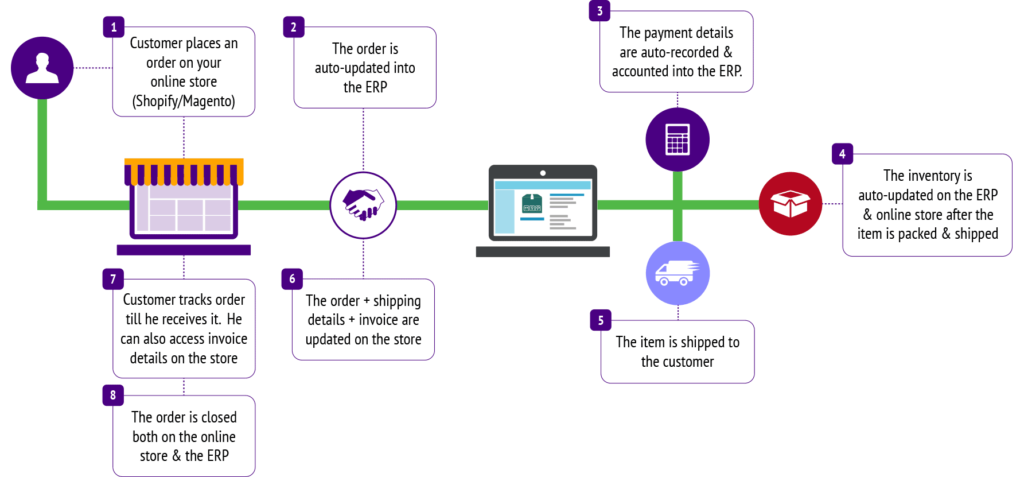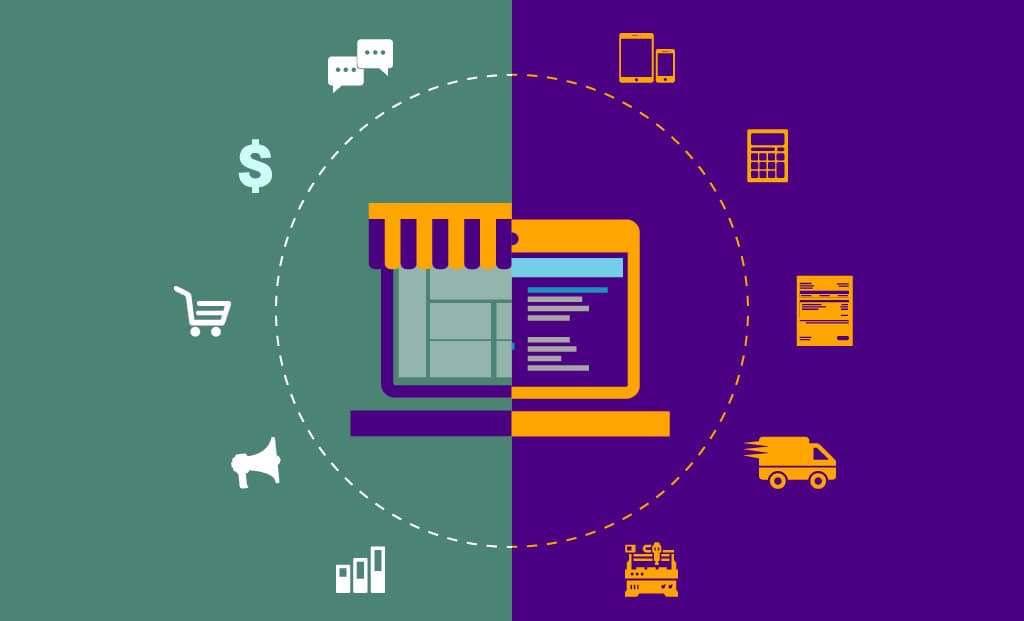Today’s sales of products and services have increasingly shifted to the online, digital medium. You might have read the recent news that Google has expanded its partnership with Shopify to introduce a simplified process of getting the products of small businesses listed directly with just a few clicks. With this, Google aims to benefit 1.7 million merchants who are on Shopify. Partnerships like these are expanding the horizon of online sales through every connected device.
Leveraging platforms such as Shopify and Magento kick starts your digital transformation by enabling you to sell through Walmart, Google, Amazon, etc. leading to an exponential increase in online sales. The next natural step in this transformation is setting up your front office to seamlessly integrate with online store platforms for greater operational efficiencies.
How does Integration between ERP Software & Online Stores work?

Key Features of E-Commerce and ERP Software Integration
Automated Order Management
Customers get the flexibility of browsing through your entire product range and instantly placing an order through the online platform. They also receive multiple modes of payment options, thereby making it even easier for them to place their online order.
As per the system’s advanced integration, the order is auto-recorded within the ERP software. The order progress details are also updated within the system and are then reflected on the e-commerce portal for the customers’ convenience. Customers get frequent order updates on the portal & via email till the product is delivered.
Automated Inventory and Pricing Sync
On each order placement, the ERP software checks for inventory availability for order fulfilment. In the case of ready availability, personnel can proceed to dispatch the product to the customer. In case of a shortfall, a work order is auto-generated for the shop floor to manufacture the product within the specified deadline.
Also, any pricing and product update changes done to inventory within the ERP software are reflected on the front-end e-commerce portal as well. This prevents over-selling in case of higher inventory levels and overproduction in case of lesser inventory levels.
Inventory updates on the ERP software and the e-commerce portal are instantaneous on each order, thereby ensuring correct information is available to customers and business owners at all times.
Improved Customer Relationship
Customers expect up-to-date and timely information about their order(s) at all times. The e-commerce integration within the ERP software ensures that they receive auto-updates of each order on their emails and phones. Apart from this, they can also track their shipments till the product is delivered. Further, they have instant access to invoices and can download them from the eCommerce portal. They also get real-time stock availability and price information letting them make informed purchase decisions.
Enabling customers to track and manage their orders improves customer satisfaction and enterprise reputation. Time and costs are saved as fewer phone calls and email exchanges are made to procure order updates and other related information.
In case of a defective product batch, customers can easily place a request for replacement or refund on the e-commerce portal. This ensures speedy product recall and customer refunds.
Comprehensive Analytics & Reporting
The system’s deep integration helps ensure that you can now utilize useful customer data such as buying behavior, product searches, product movement, sales numbers, and demographic breakdown within ERP software. Based on this data, you can make changes to your sales forecast and production planning by knowing what products are in most-demand, most-sold, and in what regions. The data also provides you an in-depth demographic detail of your customers – helping you to make critical decisions on customer requirements, product portfolio, logistics, pricing, product marketing, etc.
Enterprise Brand Promotion & Growth
E-commerce portals have in-built algorithms and SEO rules that optimize your store based on online sales and footfalls. It ensures that your store is listed in the initial search results every time a prospect searches for the relevant product. Also, with adequate brand promotions, on-time customer delivery, and feedback, you can grow the visibility of your online platform to more prospects.
Also, with the e-commerce store being open to customers 24/7, the convenience of your customers looking at your products online and placing an order instantly – at any time from any place – boosts your production and business numbers considerably.
Also, you have the flexibility to open and operate multiple online marketplaces and at the same time, keep the offline sales channels without losing operational efficiency.
Talk to experts at OmegaCube ERP for digital transformation of your business.
Contact us to know more and for an in-depth demo.







5 Responses
Just exploring your services
Non ut quae sit expedita adipisicing minima amet facilis possimus et quae nihil
Omnis deserunt ullam exercitationem temporibus
Voluptas quam Nam quis omnis eveniet voluptatem Doloribus dolore doloremque facilis voluptatem Quis veniam labore accusamus et
Corporis dolorem exercitationem quia neque obcaecati quo sed autem dolor